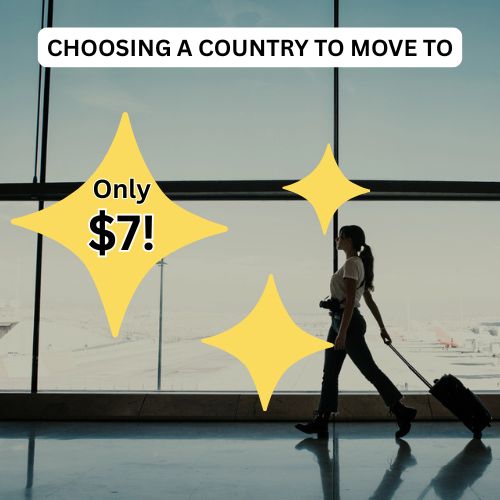How To Work Abroad & Travel The World
The thought of getting a job abroad may sound appealing to many, but the reality is too many people are put off by the thought of doing it. They have no idea how to even begin the process or what their actual options are for getting a job abroad.
So how to get a job abroad!?
Don’t worry! I got your back. I’ve done a few jobs abroad, have tons of friends who have worked around the world, and I understand the process a lot more after years on the road.
I’m going to help you find all the opportunities out there and answer how you can work abroad right here. Let’s get started!
Table of Contents
- How To Work Abroad and Get a Job Abroad!
- How To Work Abroad Through a Working Holiday Visa
- How to Work Abroad Through Skilled Visas
- READY TO LEAVE THE COUNTRY — JUST NOT SURE WHERE TO?
- How to Work Abroad in Europe
- How to Work Abroad Teaching English
- How to Work Abroad as a Digital Nomad
- How to Work Abroad as a House/Pet Sitter
- How to Work Abroad as an Au Pair
- How to Work Abroad Through Work Exchanges
- How to Work Abroad Through Volunteering
- Other Ways to Work Abroad
- Do I Need a Degree to Get a Job Abroad?
- Tips for Finding Work Abroad
- More Jobs Abroad
How To Work Abroad and Get a Job Abroad!
One thing to remember before we move on in this post is that each country has its own rules. On top of that, those wondering how to work abroad are also bound to the specific country’s rules depending on YOUR passport.
While A LOT of what I’m going to tell you below applies to many people, particularly Americans, not every single work abroad opportunity below can apply to every person reading this.

Always check the immigration website for each country and dig a bit deeper to make sure you and your country are available for the work abroad opportunity mentioned.
Let’s get into how to work abroad!
How To Work Abroad Through a Working Holiday Visa
The typical visa of choice for those looking for work while traveling is the Working Holiday Visa. The visa varies from country to country but generally caters to those between the ages of 18 and 30, with some countries going up to 35.
How long you can stay also depends on the country but is usually between 1-2 years. These are a great option if you are fresh out of college, as they require little to no skills and are very simple to apply for.

Many different countries offer these visas, but Americans only get six. In general, most countries that offer these visas are English-speaking commonwealth countries such as Australia, New Zealand, Ireland, and Canada, but there are also South Korea and Singapore.
For people of other nationalities, such as those from the UK or Canada, you have more options.
In all cases, you’ll have to pay to get the visa, which is often a few hundred bucks, but the application process is pretty straightforward. They usually come with a series of regulations, such as you can only work in one place for six months, to encourage you to work and travel.
There are some additional regulations; for example, in Australia, you have to complete a specific number of days of rural labor work before getting a second year.
RELATED: Working Holiday Visas For Americans and Other Ways to Work Abroad
What Type of Jobs Abroad Can You Do on This Visa?
The type of work available with a Working Holiday Visa varies greatly, but most people will become office assistants, farmers, waiters, or other similar service jobs. Sure, the money might not always be amazing, but as long as it is enough for you to pay for food and lodging, as well as some extra for adventuring, this is usually enough.
This doesn’t have to be the case, though. My boyfriend and I saved TONS of cash working in Australia. What job abroad did we do? Bartending, waitressing and retail! Yep, that’s right. These “whatever” jobs earned us good money there.

In most cases, you won’t get a job until you reach your destination country, which can be a little scary. When you land, you can start looking for work right away. Some companies are available to place travelers, which can be a good place to start, but it’s not necessary. Some hostels also have job boards.
If you want an easy way to live in another country for a while and are not bothered too much about the sort of work you do, then a Working Holiday Visa may be the best option for your needs. This is also a great way to get a job abroad without any experience in a specific field.
- Working Holiday Visas For Americans and Other Ways To Work Abroad
- A Guide To All 13 of the Working Holiday Visas for Canadians
- Working Holiday Visas for UK Citizens & Work Abroad Opportunities
- The Ultimate Guide To the Australian Working Holiday Visa and Why To Go NOW!
- Work & Travel New Zealand: Get a Working Holiday Visa For New Zealand
RELATED: How To Get a Job in Australia and Save a Sh*t Ton of Money.
How to Work Abroad Through Skilled Visas
If you have a particular skill set, such as having years of experience being a nurse, being proficient in the tech or medical industry, or any other skill that another country may require a skilled visa is a good option.

Many countries worldwide welcome immigrants who have a specific skill set to work and live in their country through a skilled visa scheme. The country looks to source critical skills, which vary greatly depending on the destination.
Still, they will look at the skills and experience that an individual can bring to the country, especially if, locally, that skill is in short supply.
Unlock FREE Flights and Hotels!
Credit cards aren’t just for spending—they’re your ticket to epic travel rewards!
By using the right card for your everyday purchases, you could earn points for free flights, hotel stays, and more. No tricks, just smarter travel. Ready to see how?
Types of Skilled Visas
There are two paths to this kind of visa. The first is for a local company to sponsor the applicant through a job offer, so you will have to have been offered a job before applying for the visa.

The second method is to obtain a skilled visa without actually having a job offer first. You will most likely get accepted for a visa if your skills lie within your desired country’s skills shortage list, which is constantly updated.
Getting a Job Abroad Through Skilled Work Visas
Here are some popular country examples and their skilled visas. A Google search will surely reveal tons more!
How to Work Abroad in Australia
Australia is a very popular destination for skilled workers. For skilled workers looking to live and work in Australia, you have to go through the SkillSelect program, where individuals may be able to get a permanent Australian visa taking into account qualifications, work experience, and language ability.
The SkillSelect program works very much like a job board, where available jobs can be matched to potential employees who meet the skill requirements. You’ll have to make sure you meet the minimum point score of 65 and that your occupation of choice is included under the list of skilled occupations that allow you to apply.

You must then present an Expression of Interest (EOI) before being invited to apply for the visa. There is a relatively large list of occupations on the list, over 400, ranging from accountant to illustrator, ICT support engineer to optometrist, so it is worth taking a look.
How to Work Abroad in New Zealand
New Zealand has a skilled visa that is open to a range of applicants. The country invites people who have the skills to contribute to New Zealand’s economic growth to apply for the visa. Interested individuals will have to give an Expression of Interest, which details employment, work experience, and qualifications.

If this is successful, you’ll have the opportunity to apply for a visa. Expressions of Interest are rated on a points basis. You’ll have a good chance of obtaining a visa if you have a skill on the country’s skill shortage list, which you can check on the New Zealand Immigration website.
Desirable skills include construction, engineering, various health and social services, and environmental research scientists, to name a few.
How to Work Abroad in The UK
A skilled work visa in the UK is the main visa route for those skilled workers who have a job offer and are coming to the UK to take up employment. In general, the minimum salary for this visa is £25,600 per annum, but there are exceptions to this rule.

To apply for this visa, you need to have a job offer and a certificate of sponsorship from a UK employer. It is easier to get this visa if your skills can be applied to the UK’s shortage occupation list, which includes jobs like mechanical engineers, web design and development professionals, and graphic designers, to name a few.
Another method to get a skilled visa in the UK is through a Global Talent Visa. This critical skills visa aims to attract top-tier talent in specific industries, including science, medicine, technology, research, and the arts. This type of visa doesn’t tie you to any employer and is valid for up to five years, which can then be extended.
RELATED: How to Work in the UK as a Foreigner (From Someone Who Has Done it!)
How to Work Abroad in South Africa
Sunny South Africa offers a Critical Skills Work Permit. There is a national list of occupations and critical skills that are in high demand. This type of visa lasts for five years, and you don’t have to have a job offer to apply.
How to Work Abroad in Canada
The difference with a Canadian Skilled Visa program is that there are both country-wide and regional programs. The national program works on a points-based system, and although you don’t have to have a confirmed job offer, it will help add points to your application.

If your occupation is on the High Demand Occupations List, the process may be fast-tracked. There are around 350 jobs on this list, including human resource professionals, dentists, pattern makers, and chemists, to name a few. Many of Canada’s regional governments also administer independent programs.
RELATED: How to Move From The US to Canada
Are These The Only Options for Working Abroad?
These are just a few of the countries that offer skilled visas. You could also look into skilled visas in Austria, Ireland, Japan, the Netherlands, Singapore, and Germany, and there are likely more to be found.
The easiest way to check is by Googling something like this: “Skilled visas for *country*” Not every country may offer this, though!
How to Work Abroad in Europe
Now, you may have noticed that there are no working holiday visas for Europe.
A lot of you ask me about how to work abroad in Europe, and while there is no specific visa to just come to Europe to work, there are a few options for foreigners who want to make money while traveling “The Old Continent.”

Some of these options I’ve highlighted above, so if you skipped down to this section, you can go back up and read in more detail.
Work for an American Company
One of the easiest routes is to check if your employer has offices abroad. If so, you can request a transfer, and your company will likely help you obtain the proper visas and other paperwork necessary.
If you don’t have a job that has offices overseas, you can search for American companies that are located in Europe and apply for something new!
Apply for a Work Visa After You Arrive
Another option is to enter Europe on the Schengen Visa and then find work once you arrive. Some may need to check if they need a Schengen visa appointment before coming.
Germany is currently the only country that allows you to apply for a work visa once you enter the country, though this option is only available for citizens of certain countries, including the US, Australia, and a few more.
Apply for a Digital Nomad Visa
Digital nomad visas are really catching on in Europe, and there are a handful of countries that offer them, including the Czech Republic, Portugal, Norway, and more.
Look for Jobs as a Skilled Worker
Some European countries offer visas to skilled workers. What is a skilled worker, you might ask? It’s someone who possesses a specific skill, knowledge, or training that is highly sought after.
Many European countries are looking for workers in the tech and IT realm, but it all just depends on which country you’re looking at. Most government websites have lists of skilled work jobs and info about visas, and a good old Google search should get you the info you’re looking for.
I also went over “skilled work” above as well, so scroll back and check that section out again!
How to Work Abroad Teaching English
The best thing about teaching English abroad is that it can be done by pretty much anyone. It is the ultimate choice for someone who has just left college and is looking for a way to get out there and explore the big, wide world.
In fact, most (but not all) TEFL language teachers are fresh-faced 20-somethings who have stepped right out of college or university with a range of different degrees and skills behind them. That’s part of what makes it so great.
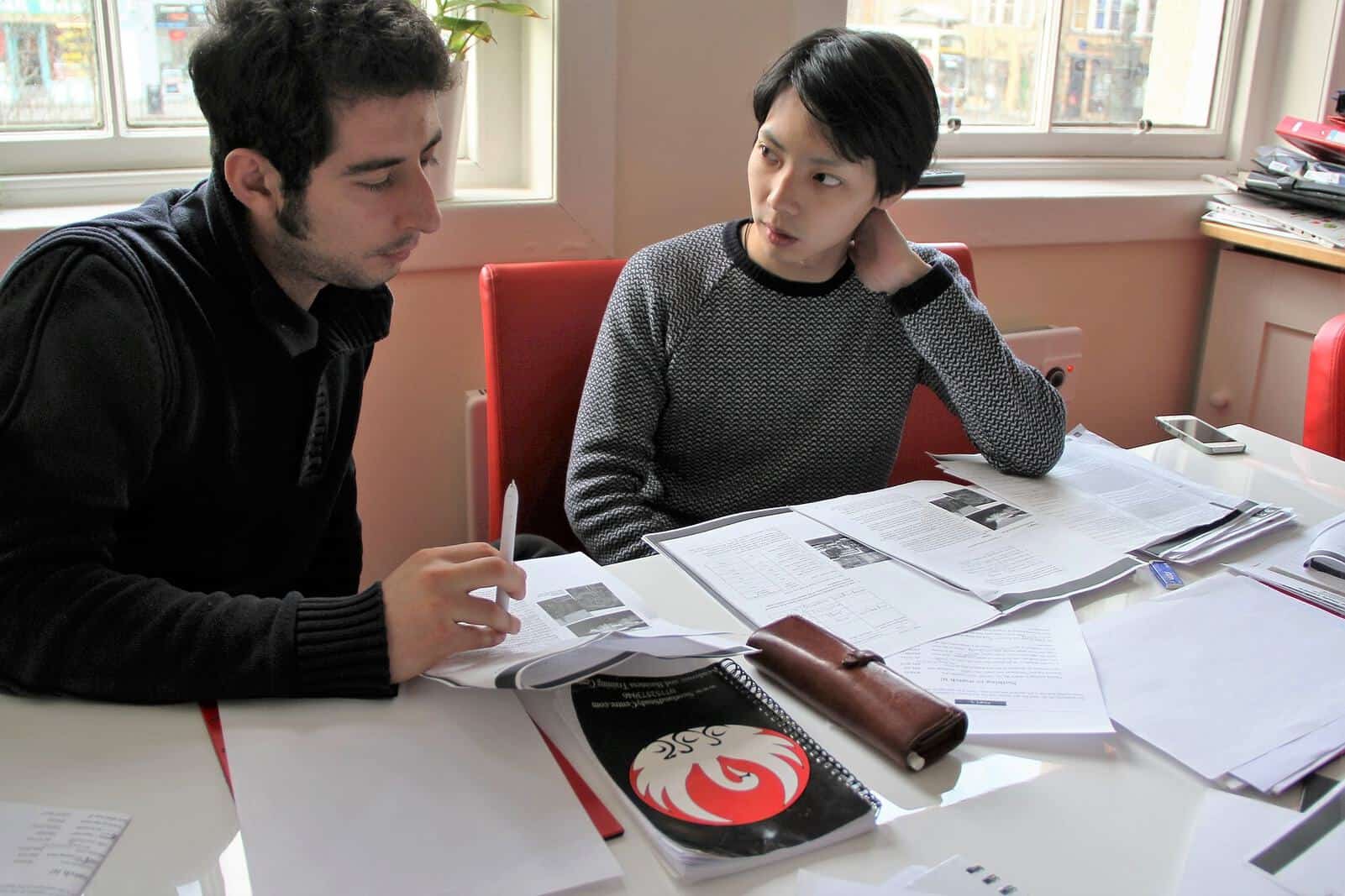
Millions and millions of people worldwide want to learn English, and that’s why English teachers are in such high demand. There are varying degrees of requirements to become an English as a Foreign Language teacher, with some jobs having more requirements than others.
Just being present and being able to speak English is enough for some places. Most will require a TEFL (click for a discount code) to know the basics of teaching, but it is possible to get this qualification online easily. If you have a TEFL qualification, you will a better chance at a job, and some countries require it to get a work visa too.
In general, teaching jobs pay well, and the hours are often flexible. Some schools will even pay for your flight!
You don’t NEED a degree to teach abroad, but it limits your options. Your degree can literally be in any topic for most situations as well.
RELATED: How To Teach Abroad – The Guide To English Teaching Anywhere
READ MORE: How to Work Abroad WITHOUT a Degree: 10 + Job Options!
How to Work Abroad as a Digital Nomad
If you work online, then your options for working and living abroad open up considerably. There are, of course, limitations when it comes to visas and how long you can stay in certain countries, but essentially you can call pretty much anywhere home for a set amount of time.
More and more countries worldwide are now offering digital nomad visas and offering intrepid individuals the opportunity to stay in a country for longer. A digital nomad is essentially someone who works online, therefore, they are not tied down to one physical location.
There are tons of digital nomad jobs available, ranging from writing jobs, tech, tutoring, graphic design and more.

It is possible to work in a different country remotely without a digital nomad visa and instead, on a tourist visa. Still, a digital nomad visa lets you stay for much longer, so you can really base yourself in one country without having to worry about your visa running out for one or two years.
With the whole world going online, more and more countries have started to offer these visas.
Digital nomad-friendly countries include Germany, the Czech Republic, Georgia, and Barbados, to name just a few. You can read my list of countries offering digital nomad visas and find out more about the different requirements in each country.
RELATED: 23 Digital Nomad Jobs: Take Your Desk Around the World
✨Everything you need to know to move abroad✨
What It’s Like Being a Digital Nomad and Working Abroad
Being a digital nomad is great, but (unfortunately) it is not all lying on the beach drinking cocktails – there is a lot of work! For a start, you will probably end up working longer than your traditional day job, especially in the first few years.
In some cases, you may end up working 50-70 hours a week as you become more established, and there is always more work that can be done.

It is effortless to take a day off here and there, but this could end up costing you if, for example, you lose a client or end up with a backlog of work. Being your own boss can be great, but you have to be strict with yourself.
There is also the issue with friendships. As you are constantly on the move, you have to be prepared to say goodbye as either you move to a different location or your newfound community does.
Starting as a digital nomad can be hard, but if you really work on it and are okay with the lifestyle it brings, it can bring some incredible opportunities. You can read my full guide on what it’s like to be a digital nomad.
How To Become a Digital Nomad
First things first, you need to work out the best place to travel. Be sure to do a lot of research before just jetting off somewhere new.
Be sure your desired location has good WiFi, for example, and locations on the cheaper end of the spectrum, at least to start with. Southeast Asia is a great hub for digital nomads as it is cheap and the internet tends to be good.
It is also important you find good digital nomad travel insurance. A couple of good ones are Safety Wing and World Nomads. The trouble tends to be that you don’t know how long you are going to be away for, and you can’t renew it while you are abroad. I choose Safety Wing as it offers the flexibility I need.
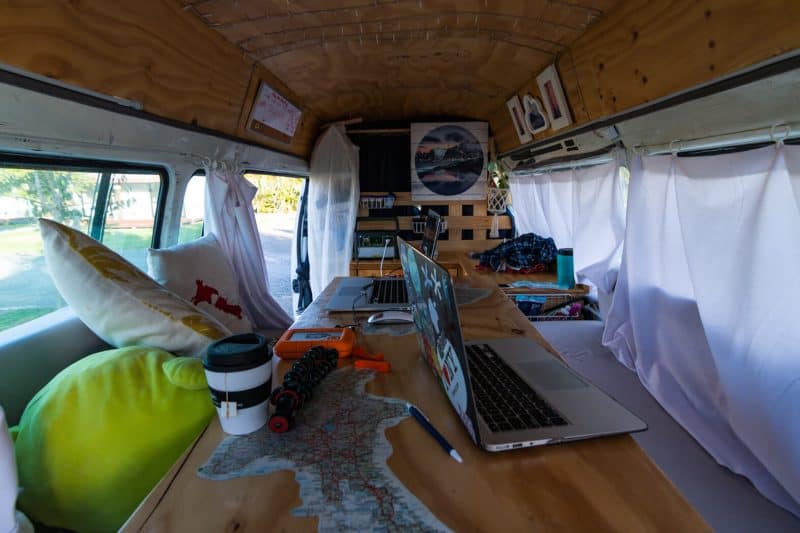
When it comes to finding work, my biggest piece of advice is to find a job that you actually want to do. Otherwise, what is the point of becoming a digital nomad? You could get into teaching English online, freelance writing, or even coding – there are tons of options out there.
Read more about being a digital nomad:
How to Work Abroad as a House/Pet Sitter
Want to feel like a local while working abroad? House and pet sitting is a great way to get free accommodation abroad, and while you’re not technically making any money doing it (most times), it certainly helps keeps costs low until you can find a more lucrative line of work.
I use TrustedHousesitters, and every experience I’ve had has been wonderful. You can use the filter to search for where you want to go and how long you want to stay (1-4+ weeks), and you can also see which places offer good WiFi.
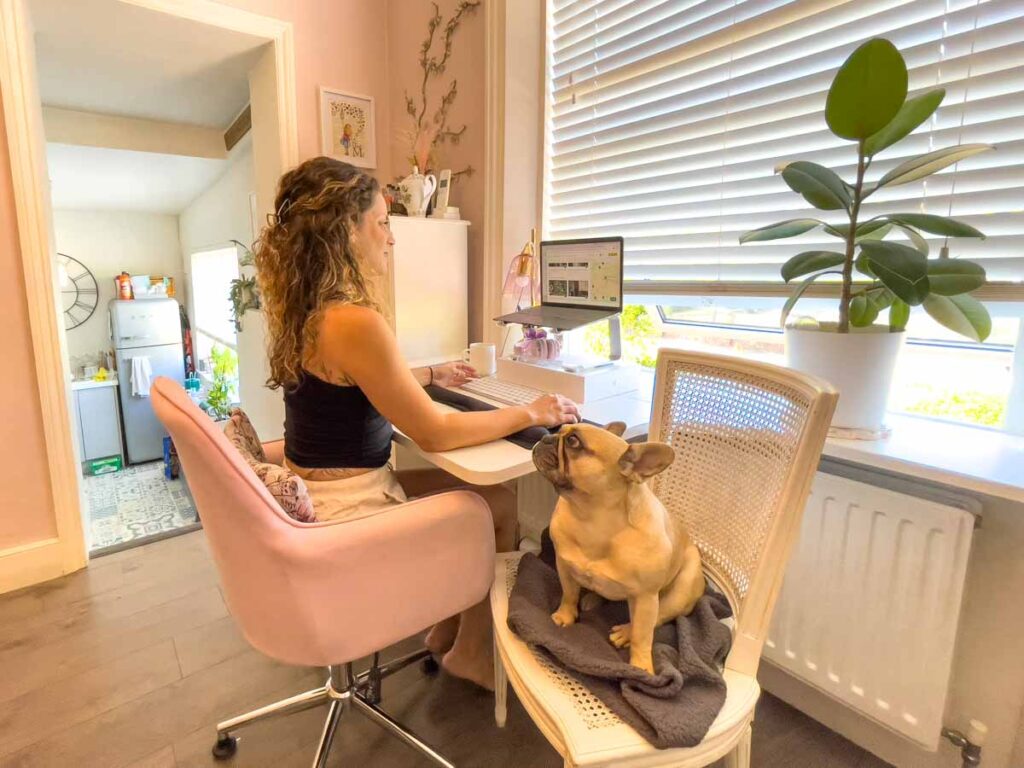
As a digital nomad, this is the perfect set-up. I get to stay in cities that are usually way over my budget for free, and I get to cuddle sweet pups and kitties too! Be aware that your number one job is the house and pet sitting!
That being said, dogs still need to be walked, and cats don’t require 24-hour supervision, so you’ll still have time to explore your local area, look for a paying job, or get some work done if you’re a digital nomad.
RELATED: An Honest TrustedHousesitters Review as a Remote Worker!
How to Work Abroad as an Au Pair
If you love kids and have experience taking care of them, you can work abroad as an Au Pair (aka a nanny). This one is old school, but even in today’s digitally obsessed world, there is still a need for child care!

Many families around the world look for English-speaking au pairs to come and take care of their kiddos, and some will pay you a hefty sum to look after their youngsters. This is a great opportunity to work abroad in Europe, with plenty of positions in Spain, England, Switzerland, and more.
If you’re extra lucky, you might even match with a family who likes to travel, which means that you’ll get to travel, and get paid! Sounds like a win-win to me!
Here are a few agencies you can check out:
How to Work Abroad Through Work Exchanges
A work exchange can be a lot of fun and are ideal if you want to see the world while on a tighter budget. Essentially, it is the closest thing you are going to get to traveling for free, as in exchange for your work, you’ll get to sleep and sometimes eat for free.
Work exchanges are quite varied, with lots of options available. You could be doing something skilled, like marketing in an office-based role, working in a hostel, or doing more manual labor. What you decide to go with very much depends on what kind of work you fancy doing.

Not having to worry about where you are going to sleep and where you will get your next meal can be a huge advantage and can take a lot of the stress out of traveling. Then, in your free time, you can go and explore.
Be aware that the majority of the time, you are not exactly going to be staying in five-star accommodation. It is likely to be the equivalent of hostel accommodation, so be prepared to give up a few ‘luxuries.’
Hostels are often looking for staff, and as the turnover is relatively high, there are usually quite a few placements available. This is great if you are looking for something temporary, as the hostel will often let you stay for free if you can help out with jobs like cleaning, working the desk, or running the bar crawls.
Don’t be afraid to ask about job opportunities, as they are not always advertised. How does one go about doing this? Use a trusted site! Here are some of the best options:
How to Work Abroad Through Volunteering
If you’re looking to find a way to give back to the community while you travel, a volunteer program may be the way to go. These opportunities are prolific all over the world and could look great on your future resume.
Worldpackers
Worldpackers is one of the most popular and well-known work abroad programs, and it’s a good place to start your search for any volunteer opportunities. Search the website either by the type of work you are interested in or the location you would like to travel to, and if you find something you like, you can apply for it.

Most positions give you board in exchange for your time, so although you won’t be paid, at least you’ll be able to get accommodation for free – perfect for seeing the world on a budget! The type of jobs you’ll find here include language exchanges, yoga retreats, farm work, photography, web design, hotel reception… All types of cool opportunities! Some may even include fun activities and food for free too.
Not sure if this is for you? Read my Worldpackers review!
Save $10 signing up with Worldpackers at this link!
Volunteering Solutions
Volunteering Solutions opportunities can be found in 20 different countries and offer something a little different in addition to standard volunteer opportunities. There are options like teaching and community work and jobs that are a little more specialized, including medical internships, working with disabled children, and sports coaching, to name a few.

Love Volunteers
Love Volunteers offers opportunities in various countries worldwide, with a focus on Africa, Asia, and Latin America. However, you may also find some in Europe and the Middle East. The application process here is pretty easy, making it great for those that want to get out there fast.
Fronteering
If you want to see the places in the world that others may not have the chance to visit, then Fronteering may be a good opportunity. You’ll be sent to the more remote places worldwide, with jobs including wildlife conservation projects and helping out indigenous communities.
WWOOFing
For many people, WOOFing is the go-to for those that are seeking farm-type work abroad. You can apply to work on a farm in countless places around the world, and in exchange, you will be given meals and accommodation.
Often, you will only be required to labor for around four to six hours per day, so you will have plenty of time to explore your local area. On your days off, you can use the time to travel a little further afield. Pick where you want to go, and see if the company has any opportunities available.

Picking Jobs
Picking Jobs is a similar platform to the more well-known WWOOFing, with seasonal farm work available in 18 countries. Whether helping with the harvest in Australia or hitting the vineyards in France, it is a good way to get aboard if you don’t have much experience. You can either apply directly to the farms or make yourself a profile and wait for the farms to come to you.
TRAVEL TIP:
You NEED Travel Insurance!
Travel insurance can save your @$$ abroad, and it doesn’t have to be expensive!
Safety Wing is what I use because it’s affordable, perfect for long or short-term travelers, and covers the important stuff.
Other Ways to Work Abroad
That’s not it! There are definitely other opportunities for getting work abroad. Here are some more ideas to get your wheels turning.
Applying For a Work Visa
If you are above 30 or 35 and don’t have a particular skill, don’t worry! There are still other ways you may be able to work abroad without any experience.
You could apply for a regular old work visa – no special skills required! This type of visa can be a little time-consuming and complicated to get, so be sure to plan and be aware that your resume and experience level can be a big advantage here.

Through an Agency
If you’ve recently graduated, then a few agencies and organizations specialize in internships and other types of work abroad, be it for a gap year or long term. Some of these programs vary in quality, so it is worth doing a bit of research before you jump in, as some may even end up costing you money.
Non-Native English Speaker Teacher
If you are not a native English speaker, that doesn’t mean you can’t teach a language overseas. Why not teach your own language? There are language schools for most languages, especially in big, international cities.
You don’t even have to be present to teach a foreign language, as there are many websites and platforms out there that allow you to connect with eager learners online. With these platforms, you can set your own rates and hours, so it’s a super flexible way to work abroad.
RELATED: How To Teach a Language Online For Non-Native Engish Speakers
How to Work Abroad – Seasonally!
There is a big demand for temporary labor abroad when it comes to seasonal work. You’ll easily be able to travel the world this way, moving with the seasons. Work on boats, ski resorts, bars, or on a farm – there are many options out there, especially in tourist seasons.

When deciding what kind of seasonal work you want, first consider your skills. If you are a great entertainer, working on a cruise ship might be worth exploring, or if you can ski, check out places that are looking for new ski instructors.
You’ll have to check if you need any certificates or training before you get started. For example, if you want to work on boats, you will need the STCW training, or if you are working with children, you may need to get a background check. The regulations vary from job to job and country to country.
- 17+ Seasonal & Temp Jobs That Could Get You Abroad Faster
- How To Get Seasonal National Parks Jobs in the US
How to Work Abroad for a Company With Offices Overseas
Depending on your current situation, where you’re currently employed could potentially lead to work overseas. The most likely occasion this could happen is if you work for an employer with offices abroad. If this is the case, then it might be worth arranging a meeting with your manager about the option of transferring to the overseas office.

Various big companies, such as UBS and Deloitte, are well known for offering their employees 2 or 3-year assignments at an international office. They take care of everything, from visas to moving costs.
They will even help you find an apartment and set up your cable. Booking.com has over 200 international offices and allows its employees to transfer to different counties when there is an opportunity available, and there are many others with similar schemes in place.
How to Work Abroad With Programs and Websites
All of this can be a little overwhelming, but don’t worry – you don’t have to go through the whole process independently. GoAbroad is one of the most well-known education and international travel sites out there.
It has a database of over 18,000 verified programs to choose from. Categories on the site include volunteering abroad, teaching abroad, TELF courses, Gap year options, and more.
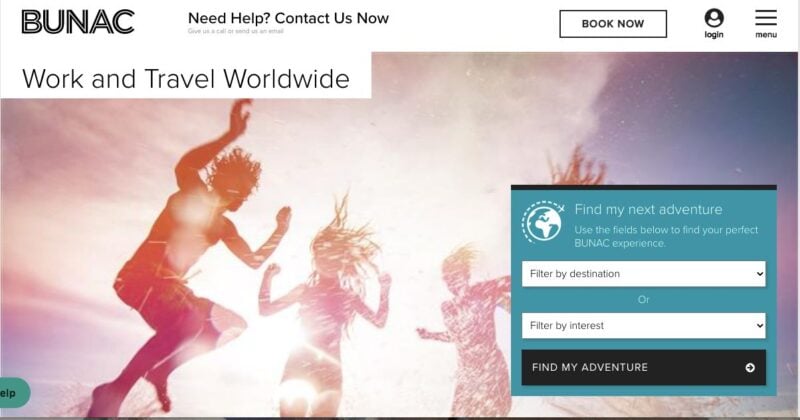
Transitions Abroad is another similar company that is a great resource for anyone looking to live or work overseas. BUNAC stands for the British Universities North America Club, a company focusing on overseas work and volunteer opportunities.
There are work abroad programs in Canada, Australia, New Zealand, Ireland, and Britain, and the company will help you with applying for your work visa.
Do I Need a Degree to Get a Job Abroad?
If I had a dollar for every time I get asked this, I wouldn’t need to work!
I kid, but seriously, this is one of the things I get asked about all the time when I talk about how to work abroad. The answer is NO! You do not need a degree to get a job abroad.
Now obviously, you won’t be able to go to a different country and just become a doctor. Certain jobs require degrees no matter where you are.

But just like in your home country, there are plenty of job opportunities all around the world that don’t require any sort of degree. You could become a freelance writer, work a seasonal gig, become a nanny – the list goes on and on. There are TONS.
I have a whole post on easy travel jobs that don’t require any sort of degree, and I mentioned it above a ton too. Note that while you may not always need a degree, some jobs do require certificates or training, but you should have no problem acquiring these with just a little bit of effort.
RELATED: The Easiest and Best Travel Jobs That Even YOU Can Get
Tips for Finding Work Abroad
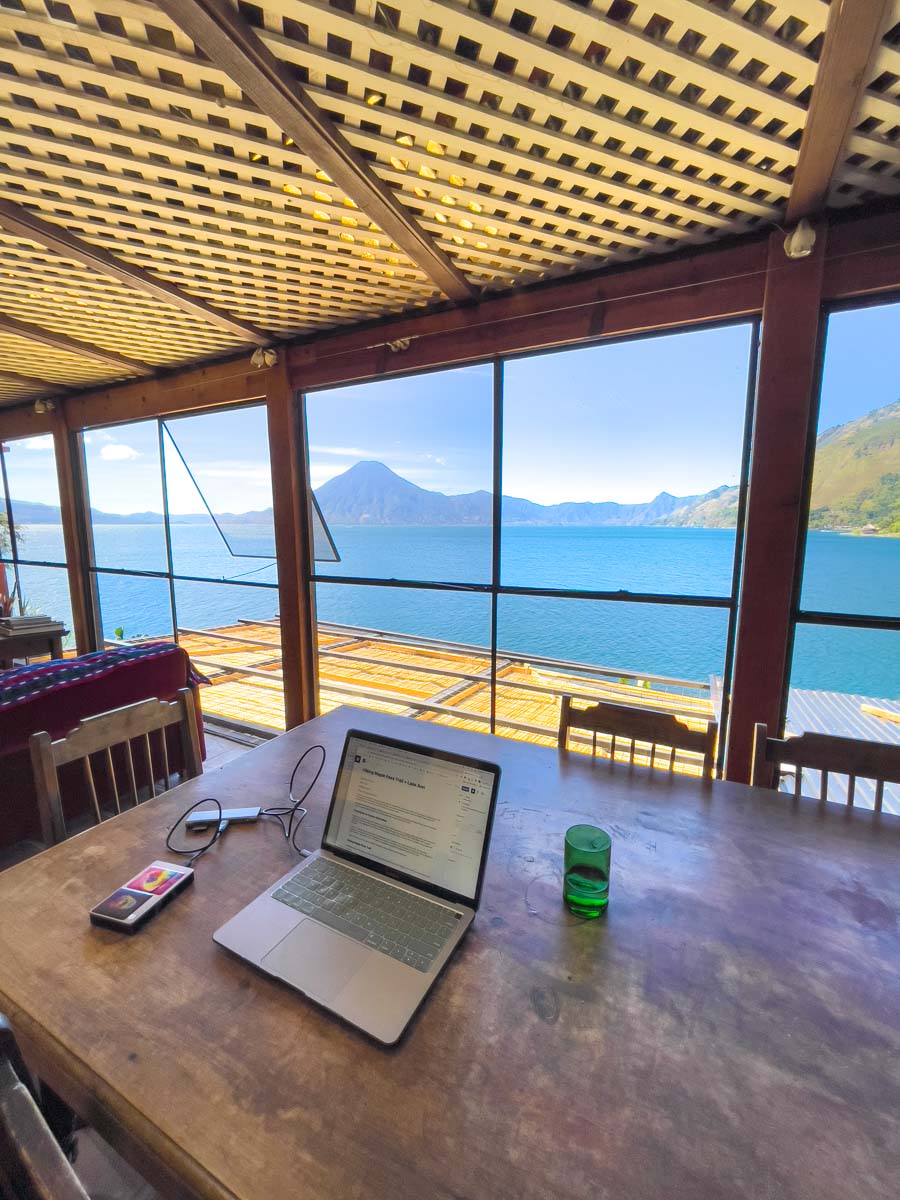
- Have a strong online presence – Like most things these days, job searches are predominantly done online. Having a strong online presence can help you get noticed by potential employers. Just make sure everything is squeaky clean on your social media platforms!
- Revamp your resume – A resume in one country will look completely different from a resume in another, so you will want to do your research. Even for entry-level jobs it’s a good idea to tailor your resume to the country you are applying to. For example, in some countries, it is essential to provide a photo of yourself, while others don’t require this, and some may even find it a little odd.
- Check the visa requirements of a country before wasting your time applying for a job in that country. You should also read all job descriptions carefully to see if they specify that you need a work visa even to be considered.
- There are other things in addition to a visa that will help you become eligible to work abroad. Check your passport and ensure it has more than six months of validity left on it, so you don’t have to push back a job starting date and make necessary doctor’s appointments as soon as possible.
- Spread the word that you are looking to work abroad. The more people you network with, the bigger the chance that someone will know someone who knows someone who has an opportunity available.
- If you are interested in a specific country, start to build up your language skills a little, as this could be a real benefit both in the interview process and when you are in that country.
Read more about living and working abroad:
- 26 Digital Nomad Jobs: Best Remote Jobs for Travelers!
- 10 BEST Digital Nomad Jobs For Beginners
- 73 Travel Jobs—How to Make Money While Traveling!
- 56 Work From Home Websites—Earn Money Outside the Office!
- 20 Online Jobs With No Experience Needed!
- How to Start Freelancing for Beginners—Work Online & Travel!
- All Articles About Living and Working Abroad


